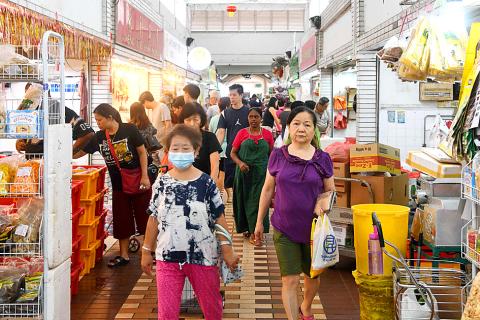Singapore yesterday unveiled a series of support packages in its budget to help cushion the economy against the coronavirus outbreak and job risks.
Singaporean Minister of Finance Heng Swee Keat (王瑞傑) said he would set aside S$800 million (US$575 million) to fight the spread of the COVID-19 outbreak, and provide two economic support packages totaling S$5.6 billion to support businesses and consumers.
“This year we usher in a new decade, one marked by tectonic shifts in our operating environment, and major uncertainties,” Heng said in his budget speech in parliament.

Photo: AFP
The government is putting in every effort to “slow down the spread of the virus,” he said.
The bulk of the S$800 million support to fight the coronavirus is to go to the Ministry of Health.
Of the S$5.6 billion economic support, S$4 billion is to primarily go toward supporting businesses with wage costs.
The rest is to assist consumers by offering “additional, timely help to more households with cost of living,” especially for lower-income families.
Singapore had been planning additional support for businesses hit by the ongoing US-China trade dispute before the coronavirus outbreak set in earlier this year.
The city-state, which has 81 confirmed cases of the virus, downgraded its growth outlook on Monday as it braces for an economic impact that is worse than the 2003 SARS pandemic.
The package announced yesterday dwarfs the S$230 million stimulus the government rolled out in the wake of the SARS outbreak.
The government still plans to raise the goods-and-services tax (GST) by 2025, but would not increase it next year, Heng said.
He outlined an enhanced package of subsidies, totally S$6 billion, to support consumers when the GST increase does take effect.
The majority of Singaporean families are to receive offsets of at least five years’ costs to cover GST expenses. Lower and middle-income Singaporeans and retirees remain eligible for additional support.
SOUTH KOREA
South Korean President Moon Jae-in yesterday said the government should make an all-out effort to cushion the economic impact from the COVID-19 outbreak, boosting expectations of further monetary easing.
“[The government] shouldn’t quibble over whether anything is unprecedented or not, rather, we should take every possible measure we can think of on the table to deploy them,” Moon said in a Cabinet meeting.
Moon said the economy is in an emergency situation and requires stimulus to lift domestic demand.
South Korea’s three-year Treasury bond futures sharply extended gains after Moon’s remarks as investors speculated stimulus measures being rolled out could include an interest rate cut when the Bank of Korea (BOK) meets on Thursday next week.
The BOK last month voted 5-2 to keep its benchmark rate steady at 1.25 percent, standing pat for a second meeting following two reductions in July and October last year.
Moon’s comments could add pressure on the bank to back government policies in the run-up to the April 15 general election.
In a Reuters survey last month, 14 of 33 analysts saw one more BOK cut through this year, while 15 saw no change.
Seoul drew up a supplementary budget in 2015 to help cushion the economy from the MERS outbreak.
Additional reporting by Reuters

In Italy’s storied gold-making hubs, jewelers are reworking their designs to trim gold content as they race to blunt the effect of record prices and appeal to shoppers watching their budgets. Gold prices hit a record high on Thursday, surging near US$5,600 an ounce, more than double a year ago as geopolitical concerns and jitters over trade pushed investors toward the safe-haven asset. The rally is putting undue pressure on small artisans as they face mounting demands from customers, including international brands, to produce cheaper items, from signature pieces to wedding rings, according to interviews with four independent jewelers in Italy’s main

Japanese Prime Minister Sanae Takaichi has talked up the benefits of a weaker yen in a campaign speech, adopting a tone at odds with her finance ministry, which has refused to rule out any options to counter excessive foreign exchange volatility. Takaichi later softened her stance, saying she did not have a preference for the yen’s direction. “People say the weak yen is bad right now, but for export industries, it’s a major opportunity,” Takaichi said on Saturday at a rally for Liberal Democratic Party candidate Daishiro Yamagiwa in Kanagawa Prefecture ahead of a snap election on Sunday. “Whether it’s selling food or

CONCERNS: Tech companies investing in AI businesses that purchase their products have raised questions among investors that they are artificially propping up demand Nvidia Corp chief executive officer Jensen Huang (黃仁勳) on Saturday said that the company would be participating in OpenAI’s latest funding round, describing it as potentially “the largest investment we’ve ever made.” “We will invest a great deal of money,” Huang told reporters while visiting Taipei. “I believe in OpenAI. The work that they do is incredible. They’re one of the most consequential companies of our time.” Huang did not say exactly how much Nvidia might contribute, but described the investment as “huge.” “Let Sam announce how much he’s going to raise — it’s for him to decide,” Huang said, referring to OpenAI

The global server market is expected to grow 12.8 percent annually this year, with artificial intelligence (AI) servers projected to account for 16.5 percent, driven by continued investment in AI infrastructure by major cloud service providers (CSPs), market researcher TrendForce Corp (集邦科技) said yesterday. Global AI server shipments this year are expected to increase 28 percent year-on-year to more than 2.7 million units, driven by sustained demand from CSPs and government sovereign cloud projects, TrendForce analyst Frank Kung (龔明德) told the Taipei Times. Demand for GPU-based AI servers, including Nvidia Corp’s GB and Vera Rubin rack systems, is expected to remain high,